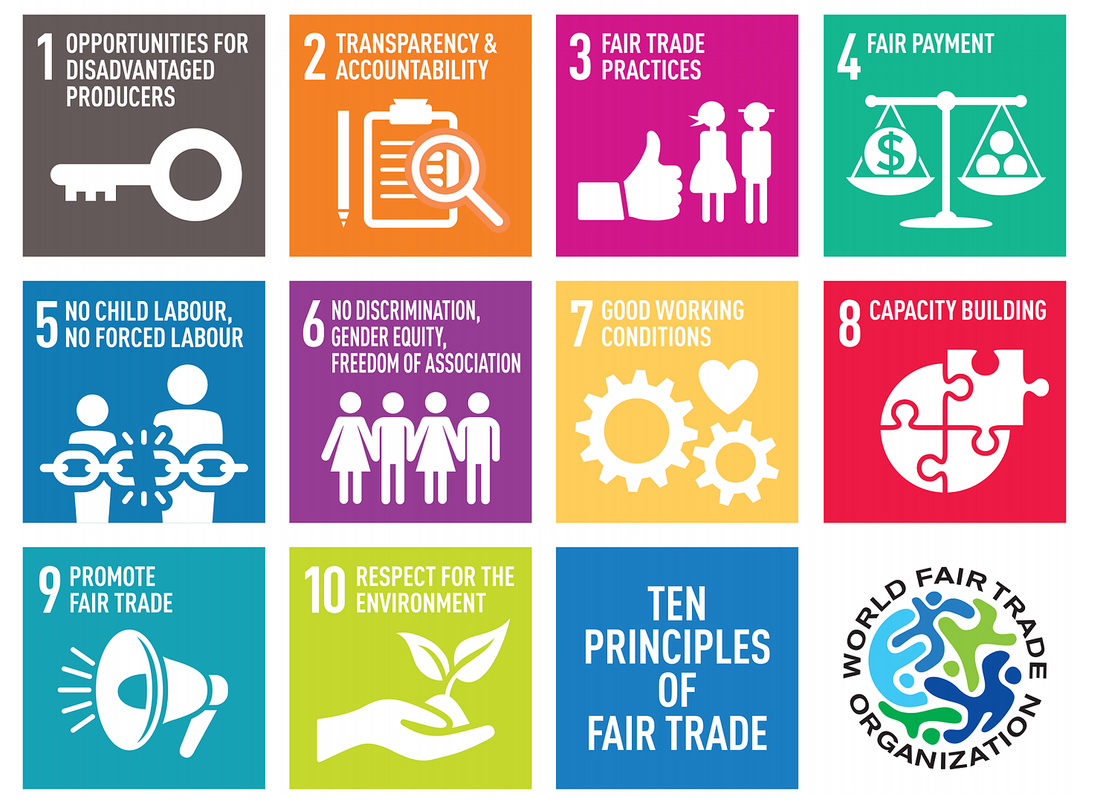1. Creating Opportunities for Economically Disadvantaged Producers
Poverty reduction through trade forms a key aim of a Fair Trade organization, which supports marginalised small producers and seeks to enable them to move from income insecurity and poverty to economic self-sufficiency and ownership.
2. Transparency and Accountability
A Fair Trade organisation is transparent in its management and commercial relations. It is accountable to all its stakeholders and respects the sensitivity and confidentiality of commercial information supplied. It finds appropriate, participatory ways to involve employees, members and producers in its decision-making processes. It ensures that relevant information is provided to all its trading partners. The communication channels are good and open at all levels of the supply chain.
3. Fair Trading Practices
A Fair Trade organisation trades with concern for the social, economic and environmental well-being of marginalised small producers and does not maximise profit at their expense. Fair Trade recognises, promotes and protects the cultural identity and traditional skills of small producers as reflected in their craft designs, food products and other related services.
4. Fair Payment
A fair payment is one that has been mutually negotiated and agreed by all through on-going dialogue and participation, which provides fair pay to the producers and can also be sustained by the market, taking into account the principle of equal pay for equal work by women and men. The aim is always the payment of a Local Living Wage. Fair Payment is made up of Fair Prices, Fair Wages and Local Living Wages.
5. Ensuring no Child Labour and Forced Labour
A Fair Trade organisation adheres to the UN Convention on the Rights of the Child, and national / local law on the employment of children. It ensures that there is no forced labour in its workforce and / or members or homeworkers.
6. Commitment to Non Discrimination, Gender Equity and Women’s Economic Empowerment, and Freedom of Association
A Fair Trade organisation does not discriminate in hiring, remuneration, access to training, promotion, termination or retirement based on race, caste, national origin, religion, disability, gender, sexual orientation, union membership, political affiliation, HIV/AIDS status or age. The organisation respects the right of all employees to form and join trade unions of their choice and to bargain collectively. Where the right to join trade unions and bargain collectively are restricted by law and/or political environment, the organisation will enable means of independent and free association and bargaining for employees.
7. Ensuring Good Working Conditions
A Fair Trade organisation provides a safe and healthy working environment for employees and / or members. It complies, at a minimum, with national and local laws and International Labour Organization conventions on health and safety.
8. Providing Capacity Building
A Fair Trade organisation seeks to increase positive developmental impacts for small, marginalised producers through Fair Trade. It develops the skills and capabilities of its own employees or members and works directly with small producers develop specific activities to help these producers improve their management skills, production capabilities and access to markets - local / regional / international / Fair Trade and mainstream as appropriate.
9. Promoting Fair Trade
A Fair Trade organisation raises awareness of the need for greater justice in world trade through Fair Trade. It advocates for the objectives and activities of Fair Trade according to the scope of the organisation. The organisation provides its customers with information about itself, the products it markets, and the producer organisations or members that make or harvest the products. Honest advertising and marketing techniques are always used.
10. Respect for the Environment
Organisations which produce Fair Trade products maximise the use of raw materials from sustainably managed sources in their ranges, buying locally when possible. They use production technologies that seek to reduce energy consumption and where possible use renewable energy technologies that minimise greenhouse gas emissions. They seek to minimise the impact of their waste stream on the environment. Fair Trade agricultural commodity producers minimise their environmental impacts, by using organic or low pesticide use production methods wherever possible. Buyers and importers of Fair Trade products give priority to buying products made from raw materials that originate from sustainably managed sources, and have the least overall impact on the environment. All organisations use recycled or easily biodegradable materials for packing to the extent possible, and goods are dispatched by sea wherever possible.
For the full text and further details, see wfto.com


